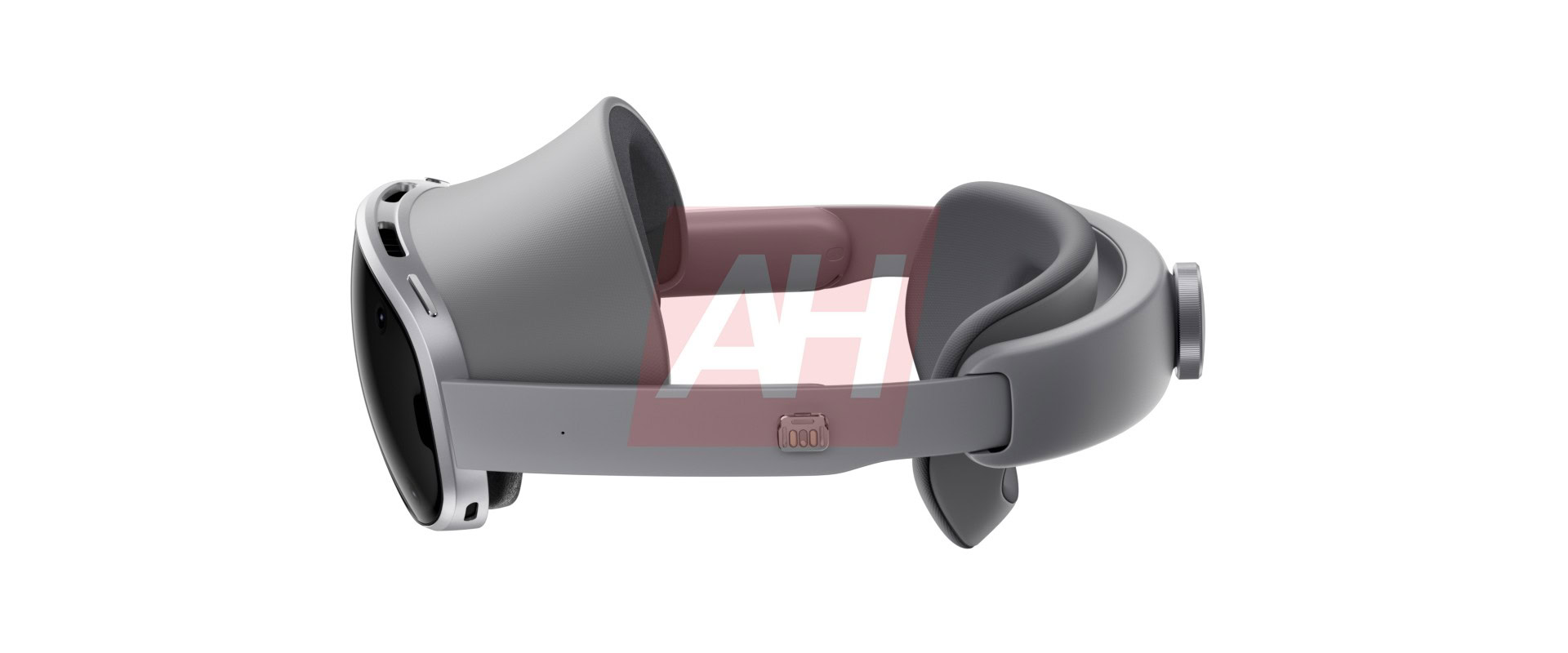The Samsung Galaxy XR is the company’s upcoming VR headset, which is based on Google’s Android XR platform. It’s also known as the ‘Project Moohan’. Those are the details many of you know at this point. The design of the headset has been officially shown several times thus far, by the company itself, but Samsung did not give out much detail in general. Well, we’re here to change that, as we have a bunch of images to share along with plenty of information about the Samsung Galaxy XR headset.
Design
Let’s start with the design of the headset itself. While you’ve seen the Galaxy XR headset thus far, it was shown from a limited number of sides. Well, if you check out the gallery below, you’ll be able to see a ton of images showing its design, from pretty much every angle. These images not only give you a closer look at the design itself, but the placement of sensors on the headset.
You’ll notice two lenses on the inside, through which you’ll see the VR world that the product offers. All around those lenses is a soft-touch material that will sit on your face and will be quite comfortable, that much we can confirm. The cutout where the nose sits is wide enough, and don’t worry, your nose will not have to carry the whole headset, not at all. In fact, it won’t carry any weight whatsoever, as the strap that goes behind your head will make sure it sits properly, in collaboration with the soft cushioning. If you take a look at the image below, you’ll see the on-face placement.

UI Design
In addition to the design of the device itself, we also have some screenshots for you from One UI XR, which will be the interface on the Galaxy XR. In the gallery below, you can see what the app launcher will look like in front of your eyes. Some well-known apps are listed here, including Samsung’s own, like Camera, Gallery, and Internet. Google’s Chrome, Maps, YouTube, Photos, and Play Store apps are here too, in addition of Netflix. You’ll also notice the Settings icon here, along with some other tweaks that are a part of the top menu. That top menu has home, Google, Gemini, and some additional icons next to it for tweaking the headset itself.
Specifications
Now, that we’ve shown you a bunch of images, let’s talk more about its specifications, as we do have plenty of information to share. We’ll talk about the Galaxy VR’s display, tracking and sensors, design and comfort, software, and more.
Display
Let’s kick things off with the display information that we have. The Samsung Galaxy XR will feature a high-res 4K micro-OLED display. You’ll get a PPI of 4,032 with this headset, while the headset will deliver a total of 29 million pixels across the two displays. As a reminder, the Apple Vision Pro delivers 23 million pixels. Samsung is also promising vivid image and true-to-life colors, which is unsurprising.
Processor

The Snapdragon XR2+ Gen 2 processor will run the show here. Samsung worked with both Qualcomm and Google to bring out the best in both this chip and the software provided by Google. This processor can deliver 4.3K resolution per eye. It can also provide 15% higher GPU, and 20% higher CPU max frequencies. On top of all that, it’s also more than capable to run all the spatial audio, gestures, AI, and tracking needed for this headset to work properly.
Tracking and Sensors
The Samsung Galaxy XR will combine input from your hands, eyes, and your voice in order to offer full control. It is packed with various sensors. If you take a look at the front side of the headset, you’ll notice a bunch of sensors under the glass. The ones in the top-left, top-right, bottom-left, and bottom-right corners are for hand tracking. The same goes for the two rounds sensors at the bottom of the headset, next to the nose cutout. These sensors will pick up on your hand gestures.
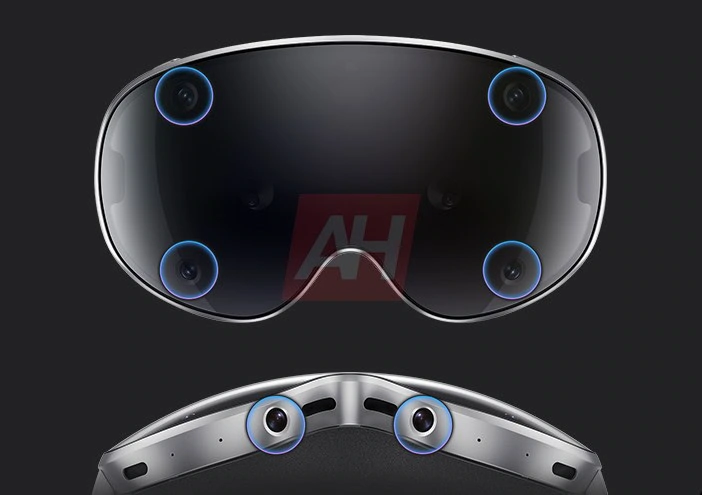
There is also a depth sensor included on the device, It is located the closest to your forehead, and centered at the top of the front side of the headset. That sensor’s job is to help the headset better understand the scene it’s currently in. It’s supposed to recognize walls, floors, ceilings, and everything else around your.
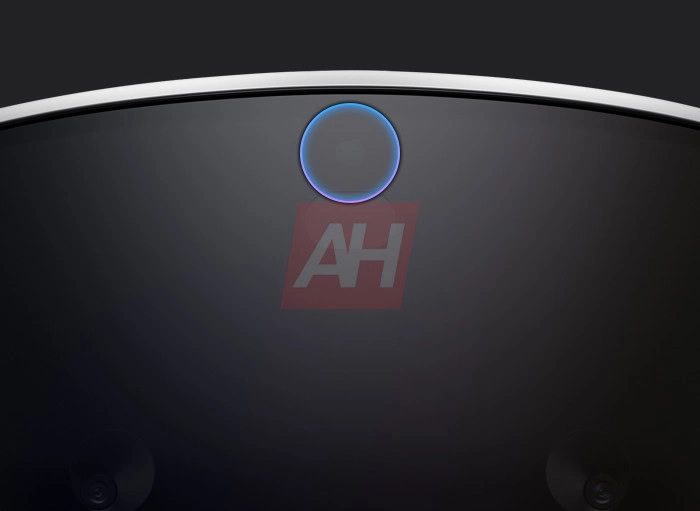
Eye tracking is also immensely important. There are four eye-tracking cameras included on the Galaxy XR. They use infrared LEDs and AI in order to track your eyes. They are able to detect your eye movements in detail, and that includes recognizing where your pupil is at all times.
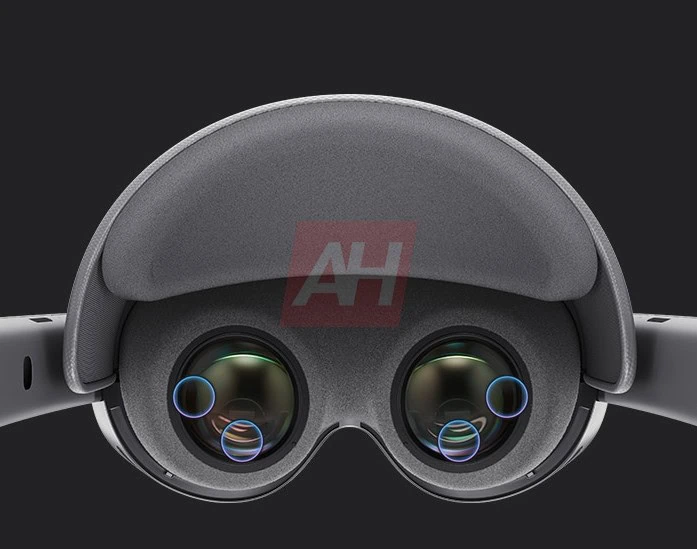
The last mention goes to voice tracking. The microphones that Samsung included on the Galaxy XR can capture sound coming from all directions, as you’d expect from a VR headset. The headset is also able to separate speech patterns. In other words, it’ll know what you’re saying vs what someone else is saying.
Design and Comfort
Samsung paid a lot of attention to the design of the Galaxy XR. The company wanted to make the device immensely comfortable to wear. The Galaxy XR weighs only 545 grams. Samsung also tried to make the headset as ergonomic as possible, hence the immense use of cushions. You’ll notice dial on the back of the head strap, which will allow you to fine-tune fit for your use. The side bands provide extra stability for wearing the headset. Let’s break things down even further.
Front side
You’ll notice six cameras on the front of the Galaxy XR. There are two world-facing cameras, and there’s also an LED on the front, which will indicate the activity status of the headset itself.
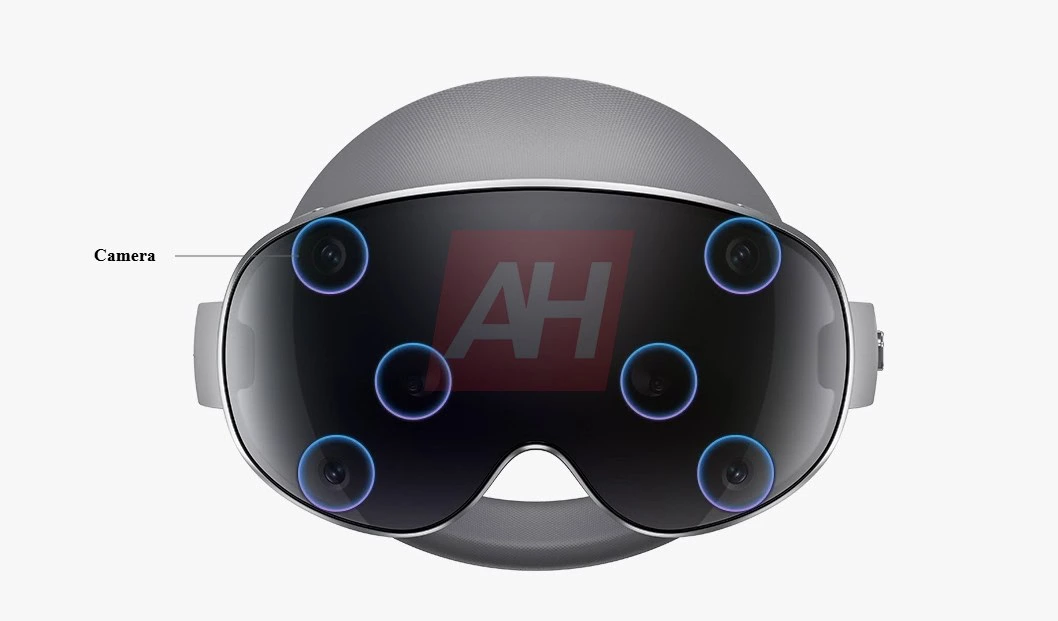
Inside
On the front side of the inside of the headset, you’ll notice two lenses and plenty of cushioning. There are also detachable light shields, which are supposed to block out the outside world and increase immersion. And finally, there are speakers on the left and right sides. All of those are shown below.
Outside (left, right, top, bottom)
On the left side of the headset sits a power connector, and it can connect to a battery pack, as shown below.
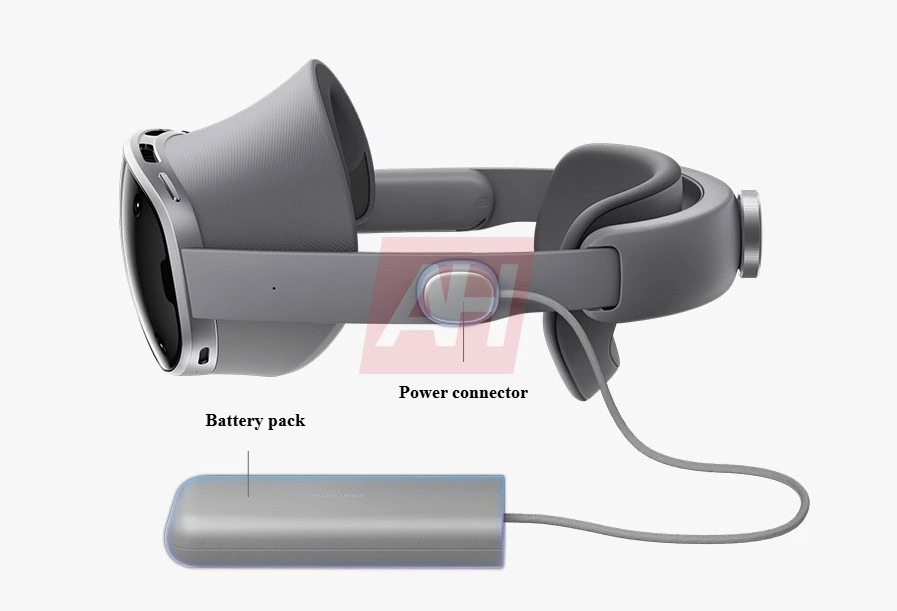
On the right stem, its outer portion, you’ll notice a touchpad. Long tap will recenter content, for example, while a double-tap will toggle VR Mode and a Pass-Through Mode.
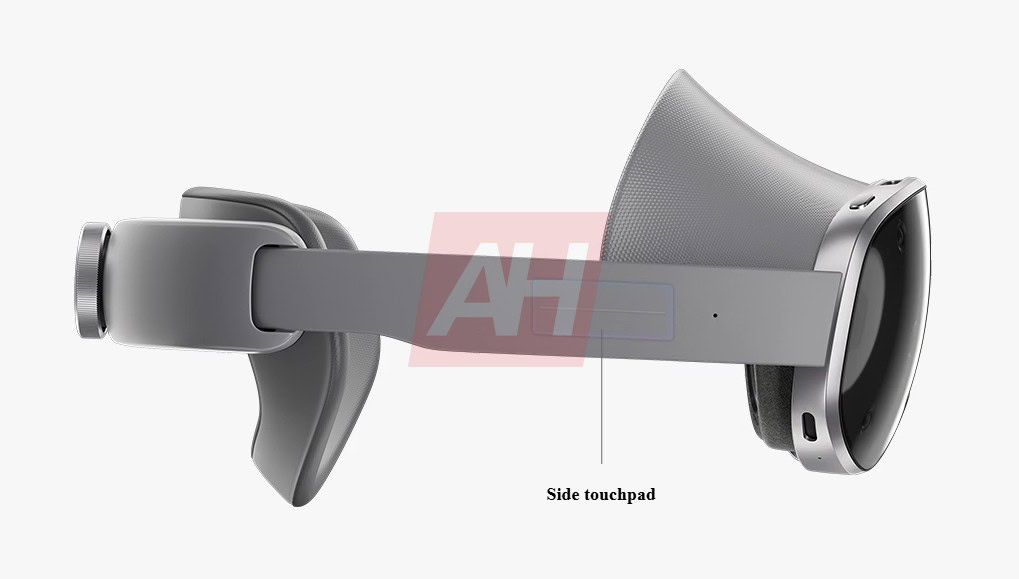
Top
At the top of the headset, you’ll notice two buttons. The left button is a volume button, while the right one is a ‘Top button’. The Top button activates the Launcher, where you can see your apps and the UI we’ve talked about earlier. If you long press it, you’ll access Google Gemini. The volume button is kind of self-explanatory.
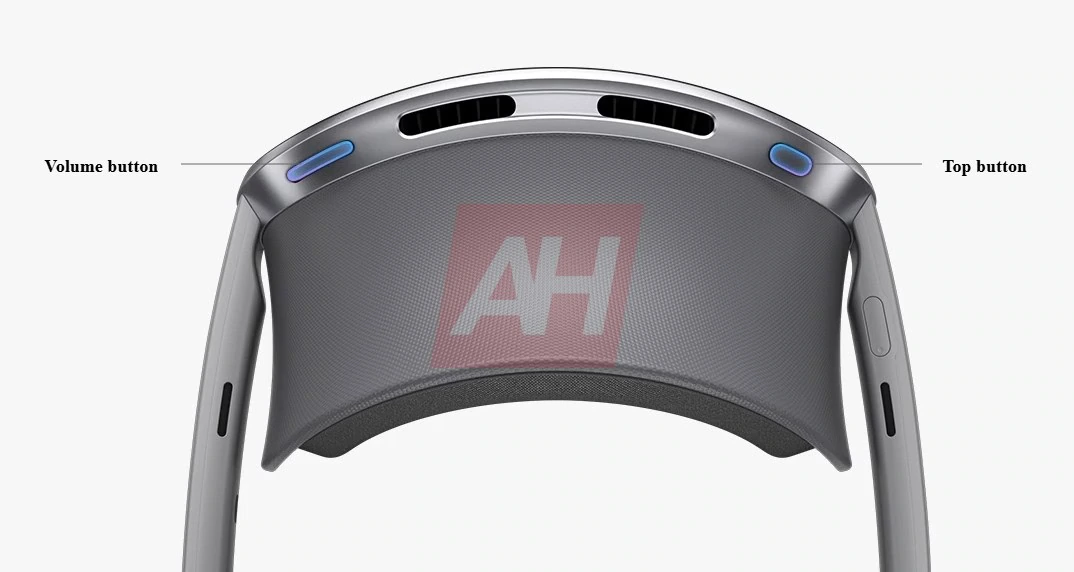
Bottom
At the bottom of the headset, you’ll notice air vents, along with a handful of sensors (including ones for hand movements), and a handful of microphones as well.
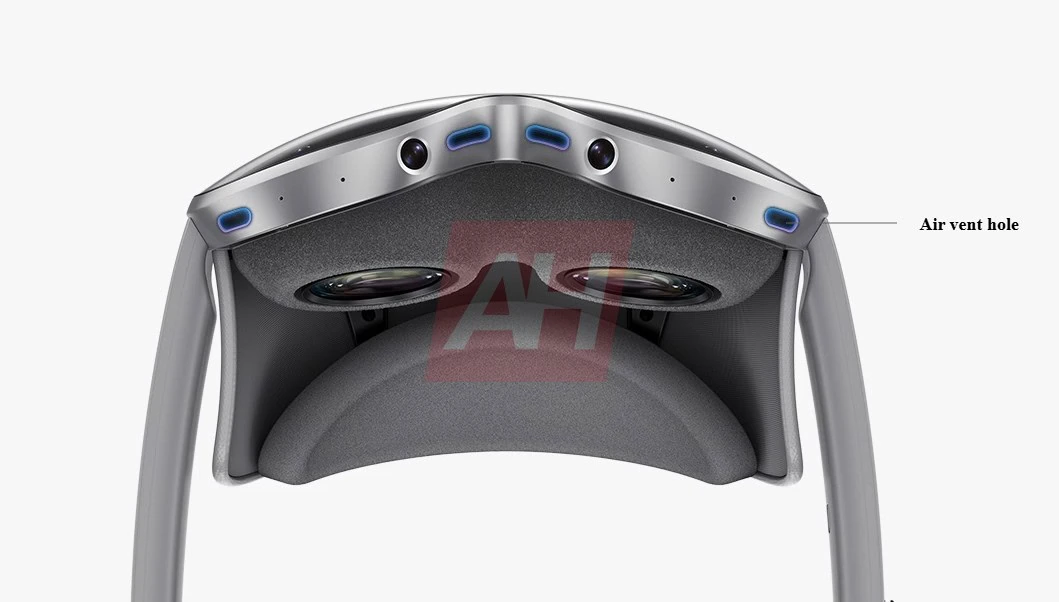
Controllers
The Galaxy XR will come with two controllers that are shown below. They’ll feature 6 DoF and analog sticks. They’re supposed to be able to track your movements very accurately in a 3D environment, as do other VR controllers. They do come with haptic feedback, by the way, which should tune up the immersion.
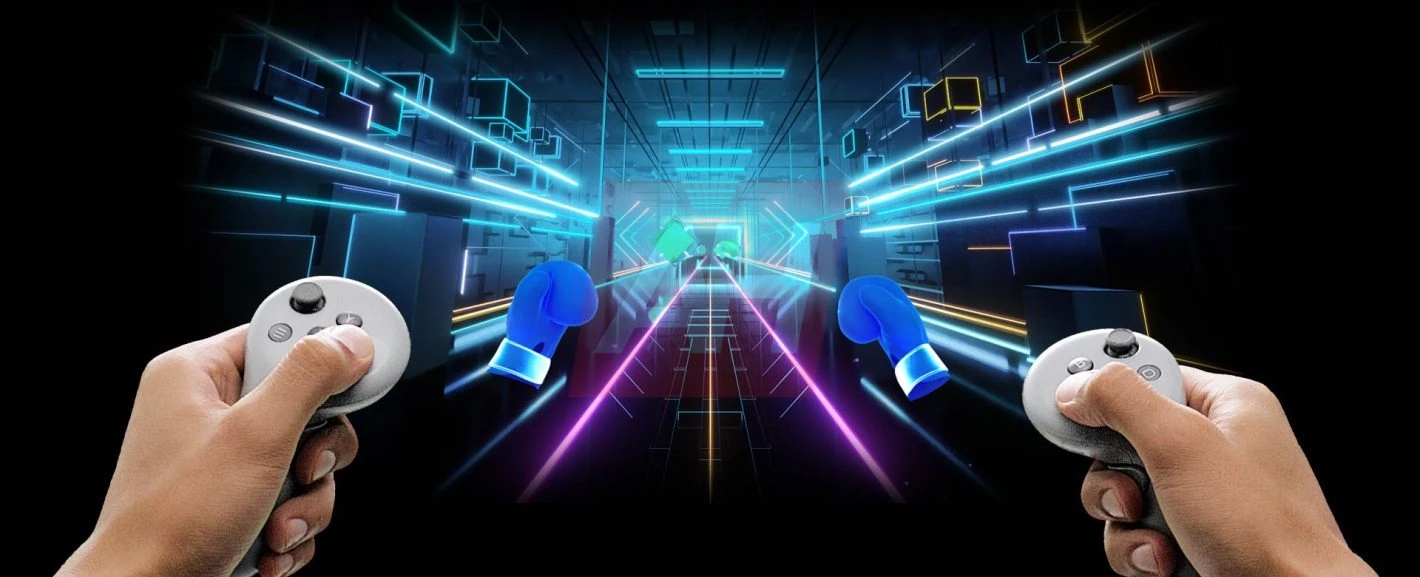
Battery Life
What about the battery life? Well, the headset will be officially rated to offer up to 2.5 hours of video playback and 2 hours of general use. That’s pretty much everything we know at this point
Audio
The Samsung Galaxy XR will offer spatial audio. Each side of the Galaxy XR will end up offering a 2-way speaker with both a woofer and a tweeter. That should provide better sound overall.
Samsung Galaxy XR Specifications
Display
4K micro-OLED, 29 million pixels, 4,032 PPI
Processor
Qualcomm Snapdragon XR2+ Gen 2
Software
Samsung One UI XR
Audio
Spatial audio, 2-way speakers
Sensors
Hand, eye and voice tracking
Controllers
Two Galaxy XR controllers, 6 DoF, analog sticks, haptic feedback
Battery Life
2 hours of general use, 2.5 hours of video playback
Weight
545 grams
Buttons
Volume button, Top button
Other
6 front cameras, LED light, power connector, air vents, Light shields
Competition
Once it launches, the Samsung Galaxy XR will have plenty of competition in the market. The two products that come to mind straight away are the Apple Vision Pro and Meta Quest 3. The Meta Quest Pro was also in there, but considering it’s no longer officially available, the Quest 3 it is. The Apple Vision Pro didn’t exactly shine in terms of popularity thus far, so it will be interesting to see where the Galaxy XR fits in.
Each of those devices has different setups compared to the Galaxy XR, but they’re all in the same ballpark, if you will. Our knowledge on the Galaxy XR is kind of limited at this point, but we did reveal quite a few details today. That gives us enough information to pit the Galaxy XR vs the Apple Vision Pro and Meta Quest 3, at least in the spec department. So let’s do that. We’ll do it in the table form for easier content consumption.
Samsung Galaxy XRApple Vision ProMeta Quest 3Display4K micro-OLED, 29 million pixels, 4,032 PPITwo micro-OLED displays, 23 million pixels, up to 100Hz refresh rateTwo micro-OLED displays, 23 million pixels, upt to 100Hz refresh rateProcessorQualcomm Snapdragon XR2+ Gen 2Apple M2 8-core and 10-core chipsQualcomm Snapdragon XR2 Gen 2SoftwareSamsung One UI XRApple visionOSMeta VR OSAudioSpatial audio, 2-way speakersSpatial audio speakersSpatial audio speakers, 3.5mm jackSensorsHand, eye and voice trackingSpatial mapping, environment sensing, hand and eye tracking, array of cameras6 DoF head and hand tracking, Oculus Insight, array of camerasControllersTwo Galaxy XR controllers, 6 DoF, analog sticks, haptic feedbackThird-partyTouch Plus controllers (2x)Battery LifeUp to 2 hours of general use, 2.5 hours of video playbackUp to 2 hours of general use, 2.5 horus of video playback2-3 hours of ‘typical usage’, 4,985mAh batteryWeight545 grams600-650 grams515 grams (approximately)ButtonsVolume button, Top buttonTop button, Digital CrownPowerOther6 front cameras, LED light, power connector, air vents, Light shieldsWi-Fi 6, Bluetooth 5.3, 256GB/512GB/1TB storage, 16GB RAMWi-Fi 6E, Bluetooth 5.2 LE, 512GB storage, 8GB RAM
Launch Date & Price
The Samsung Galaxy XR launch date has not been confirmed just yet. However, rumors are saying that the device will launch this month. According to a report from Korea, pre-registration sign-ups will start on October 15. The device is tipped to launch on October 21 or 22. Samsung is expected to confirm the launch date in the near future. When it comes to its price tag, it is rumored to cost at least $1,800, which sounds about right. That’s just a wild rumor at this point, though.

